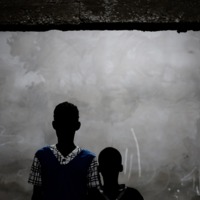
Nour Miyati
There are an estimated 61,000 people living in modern slavery in Saudi Arabia (GSI 2018). It is a source and destination country for men and women trafficked from South and South East Asia and Africa. People voluntarily migrate to the country to work in a variety of sectors including construction and domestic service; many of these workers are vulnerable to forced labour. Traffickers and brokers often illegally recruit migrants to work in Saudi Arabia and subsequently forced them into domestic servitude or debt bondage. Female domestic workers are particularly at risk of trafficking due to their isolation inside private residences. Non-payment or late payment of wages remains a complaint from foreign workers, while employer's withholding of worker's passports remains a significant problem. Trafficking perpetrators include businesses of all sizes, private families, recruitment companies in both Saudi Arabia and labor-sending countries, and organized criminal elements. Nour Miyati had migrated for work twice previously and had good experiences. However the third time she was subjected to physical abuse from her employer, forced to work long hours, had her passport confiscated and was never paid for her labour. When she was finally able to escape Nour filed criminal charges against her employers. The criminal proceedings stretched over three years, while Nour Miyati waited in the overcrowded Indonesian embassy shelter for its resolution. A Riyadh court initially convicted Nour Miyati of making false allegations, sentencing her to 79 lashes, but later overturned this decision. The court dropped charges against her male employer. It sentenced the female employer to 35 lashes for committing abuse, but on May 19, 2008, a judge also dropped the charges against the female employer. That judge still awarded Nour Miyati 2,500 riyals ($668) in compensation, a small fraction of the amounts typically awarded for the types of injuries sustained.

San Htike Win
There are an estimated 610,000 people living in conditions of modern slavery in Thailand (GSI 2018). Men, women and children are victims of human trafficking for forced labour in the Thai fishing industry, subjected to physical abuse, excessive and inhumane working hours, sleep and food deprivation, forced use of methamphetamines and long trips at sea confined to the vessel. Due to the fishing industry relying on trans-shipments at sea to reduce expenditure, some find themselves trapped on long-haul trawlers for years at a time. This makes the monitoring of enslaves labour on fishing vessels costly and difficult. In March 2013 San Htike Win was rescued from a Thai fishing vessel in Katang. Following his rescue he was held in a police station before being moved to a government run shelter in Ranong. After 11 months in the shelter, San Ktike Win tells of his frustration at the slow court process.

Olga A
There are an estimated 31,000 people living in condition of modern slavery in Israel (GSI 2018). Women from Eastern Europe, China and Ghana, as well as Eritrean men and women are subjected to sex trafficking in Israel. People are often lured through the promise of seemingly legitimate jobs, only to be subjected to commercial sexual exploitation upon arrival. Olga tells of her escape from a brothel in Israel.

Said and Yarg
There are an estimated 43,000 people living in conditions of modern slavery in Mauritania, including up to 20,000 in forced labour. Slavery is entrenched in Mauritanian society, with slave status deeply rooted in social caste and being inherited from generation to generation. Of those in forced labour, Walk Free survey results estimate approximately 42 percent were exploited for domestic work. Forced labour in the domestic sector commonly includes women performing domestic chores, such as fetching water, gathering firewood, preparing food, pounding millet and caring for their master's children. Men and boys enslaved in the domestic sector typically herd animals (camels, cows, goats) or are forced to work in the fields. Said Ould Salem, now 16, and his brother Yarg, 13, were born into slavery to the wealthy El Hassine family in Mauritania, having inherited the slave status from their mother. They worked all days from a very early age whilst their master’s children went to school and played football. The boys managed to escape in April 2011 thanks to the help of SOS-Esclaves. Later, with the help of Anti-Slavery International, their master became the first slave-owner ever prosecuted for slavery in Mauritania’s history. However, he was released on bail until the appeal. The boys waited for the appeal for nearly five years. With Anti-Slavery’s support, their case was taken by Minority Rights Group International (MRG) to an African Union court in 2016, prompting a response from Mauritanian authorities and organising the appeal hearing in November 2016. The Court of Appeal increased the level of compensation awarded to the boys. However, their former slave owner’s sentence has remained unchanged, requiring him to serve only two years, when the law requires 5-10 years for the crime of slavery. The boys’ lawyers will appeal the sentence to the Supreme Court. Meanwhile, Said and Yarg are both in secondary school and respectively dream of becoming a human rights defender and a lawyer.

Shelly A.
The United Arab Emirates is a destination for men and women predominantly from South and Southeast Asia, trafficked for the purposes of labour and commercial sexual exploitation. Migrant workers make up over 90 per cent of the UAE’s private sector workforce and are recruited from India, Bangladesh, Pakistan, Nepal, Sri Lanka, Indonesia, Ethiopia, Eritrea, China, and the Philippines. Though some travel willingly, they are subjected to conditions of modern slavery including withholding of passports, non-payment of wages, restrictions of movement and threats of physical and sexual abuse. Trafficking of domestic workers is facilitated by the fact that normal protections for workers under UAE labour laws do not apply to domestic workers, leaving them more vulnerable to abuse Shelly A. travelled from the Philippines to the UAE for domestic work. Her sponsor forced her to work under the threat of physical abuse and her employer withheld her salary, paying only the initial 3 months but making her sign receipts stating she was in receipt of her salary. Her employer took her passport, confined her to the house and subjected her to physical abuse. Shelly A. filed a criminal case against her employers which has yet to reach an outcome.